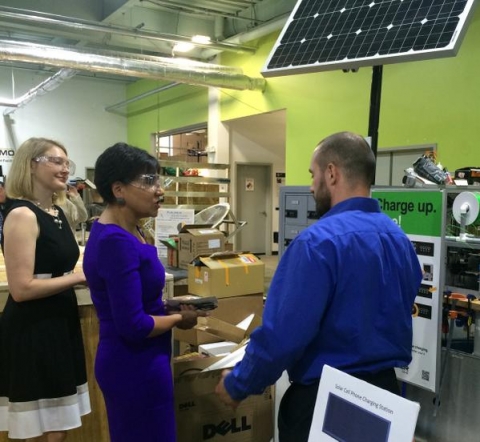Apr222016
Posted at 1:05 PM
Publication:
In 1970, when Earth Day first began and renewable technologies were in their infancy, few Americans could have imagined the ability to plug in their car rather than refuel at the gas station. Few would have dreamt of a world in which our homes, businesses and communities could be powered entirely by solar energy – let alone wind or the waves of the ocean.
Today, we have truly transformed and diversified our energy sector. This has been good not just for consumers and the environment, but for American industry itself. American companies are demonstrating that taking action to address our changing climate is not just a moral imperative – it actually makes good business sense.
California-based Sensity Systems, for example, has deployed sensors that improve control of LED street lights, creating greater efficiencies and data streams that can make cities run “smarter.” Solar City, the largest solar power provider in the country, is enlisting a new customer every three minutes. Growth in their industry is so strong that the firm is opening the largest solar manufacturing facility in the Western Hemisphere in Buffalo, New York, which will create 5,000 jobs.
A number of American household names have lent their support to action on climate change, driven in part by President Obama’s strong leadership on this issue. The White House has announced hundreds of commitments to “The American Business Act on Climate Pledge,” under which firms with operations in all 50 states have created company-specific goals such as reducing emissions and water usage, achieving zero waste-to-landfill, purchasing 100 percent renewable energy, or pursuing zero net deforestation in their supply chains.
These firms recognize that customers value sustainably produced products, regardless of industry. Coca-Cola, for example, has pledged to reduce the carbon footprint of “the drink in your hand” by 25% by 2020, a promise that involves its entire value chain, including ingredient sourcing, manufacturing, packaging, delivery, and refrigeration.
As Secretary of Commerce, I have had the privilege of meeting America’s greatest and most innovative business leaders and entrepreneurs whose products and services hold a competitive edge in the 21st century economy. I know that U.S. industry is uniquely positioned to provide leadership in sustainability practices and devise much-needed technologies and solutions as the global community confronts the challenge of climate change.
Clean energy solutions represent one of the fastest growing market segments in the world. Last year, the global market for advanced energy technologies reached $1.4 trillion. Countries like China, the world's largest carbon emitter, will require trillions of dollars to meet the climate commitments made in the Paris Agreement last December, which was signed today by President Obama, President Xi, and 153 other countries.
Each country’s commitments are unique to its own resources and situation, but what is clear is that the Paris Climate Agreement represents a significant inflection point in the global economy. It represents a consensus accord that the future must be powered differently than the past and that all nations have a responsibility to help solve a truly global challenge.
The Paris Agreement will create new demand for lower emissions products and more efficient manufacturing processes, while driving investment in more sustainable buildings and public transportation. It will require the development of renewable energy projects around the world at a pace and scale almost unimaginable a decade ago.
In total, achieving the commitments made in Paris presents a $16.5 trillion opportunity for U.S. innovation.
The United States already has many clean technologies on the market, or on the cusp of commercialization. At the Commerce Department, we work every day to position American firms in the world's most promising markets. Through our Top Markets Reports, we are using data and analysis to guide exporters toward the best opportunities for their products and services. Through our work on trade agreements, we are eliminating barriers to trade that add unnecessary costs to export deals. And through our Foreign Commercial Service, we have positioned in-country experts at more than 80 embassies and consulates to help American firms compete abroad.
Our American firms are ideally suited to create the future industries, new business, and advanced supply chains the world needs to meet the climate challenge. Put simply, addressing climate change could be one of the greatest economic opportunities of our time. I am confident that no country is more ready to lead than the United States.
The International Trade Administration's Top Markets Reports use sector-specific methodologies to rank future export opportunities within 21 different industries, including Renewable Energy, Renewable Fuels,Environmental Technologies, and Smart Grid.



